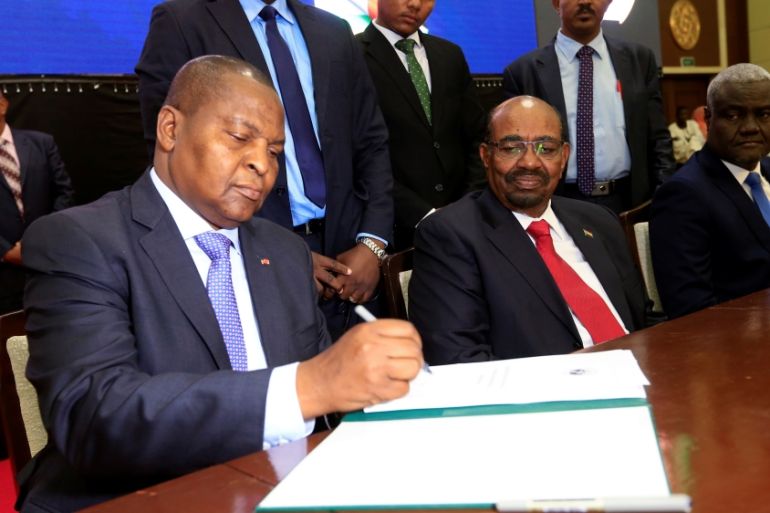CAR peace deal calls for truth commission, joint patrols: AFP
CAR peace deal includes setting up a truth and reconciliation commission as well as joint security patrols, reports AFP.

A peace deal signed between the Central African Republic (CAR) and rebel groups this week provides for the creation of a truth and reconciliation commission within 90 days, according to the AFP news agency.
Citing a copy of the undisclosed accord, the AFP said the parties to the deal also committed to set up joint security patrols with soldiers and members of armed groups for a period of 24 months.
Keep reading
list of 4 itemsPalestinian Prisoner’s Day: How many are still in Israeli detention?
‘Mama we’re dying’: Only able to hear her kids in Gaza in their final days
Europe pledges to boost aid to Sudan on unwelcome war anniversary
The deal is the eighth attempt in nearly six years to forge peace in the war-ravaged country – one of the poorest in the world – but it has not yet been signed by all the parties.
The accord was signed in the capital Bangui on Wednesday by some militia leaders and President Faustin-Archange Touadera.
The three stragglers may sign during the upcoming summit of the African Union, taking place in Addis Ababa on February 10-11, according to Ange Maxime Kazagui, a government spokesman.
If so, the accord, named the Khartoum Agreement after the city where it was brokered, will be published afterwards, he said.
|
|
The conflict has left thousands dead and forced a quarter of the population of 4.5 million from their homes. The rural exodus, the UN warned last year, could drive the country into famine.
Lack of clarity
One of the biggest obstacles to peace has been demands by rebel leaders to be amnestied – a condition that Touadera, under pressure from western partners, has traditionally refused.
Several leaders face UN sanctions or have been accused by rights groups of abuses, and others face the notional risk of arrest in CAR itself.
Lack of clarity about the Khartoum Agreement on Thursday prompted a rights organisation, the Civil Society Working Group on the Central African Crisis (GTSC), to urge the government to publish the details.
“In the absence (of these details), the GTSC calls on the Central African people to stage mass protests to press the ruling elite to publish the agreement,” it said.
The CAR’s descent into crisis began in 2012, when a predominantly Muslim movement, the Seleka, rose in the north of the country.
The following year, the rebels overthrew President Francois Bozize, a Christian, which led to the formation of mainly Christian militias called the Anti-balaka.
France, the former colonial ruler, intervened militarily under a UN mandate, and the Seleka were forced from power.
Touadera, a former prime minister, was elected president in February 2016, but controls just a fifth of the country, helped by a large UN peacekeeping force.
Militia groups, often portraying themselves as defenders of a community or religious group, control the rest of the territory, often fighting over control of mineral resources.